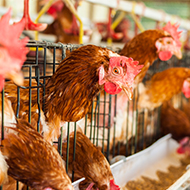RVC links unnatural body shapes with rabbit health issues
The study examined records from 162,017 rabbits.
New research from the Royal Veterinary College (RVC) has revealed the effect that an unnatural body shape, as well as inadequate diet and exercise, can have on rabbits’ health.
The project is the largest of its kind to study pet rabbits, with the RVC VetCompass team investigating the body shapes of 162,017 rabbits that were in first opinion care during 2019.
The statistics highlighted that 79.7 per cent of these rabbits were classified as being short-headed (brachycephalic). The sample was also 16.8 per cent medium-headed (mesaticephalic) rabbits.
However, only 3.51 per cent of the rabbits investigated were classified as long-headed (dolichocephalic). The researchers believe that this highlights how much has changed with rabbits' body shapes, since long-headed rabbits are the most similar in shape to wild rabbits.
The research team also examined the veterinary clinical records of a random sample of 3,933 rabbits.
This enabled them to assess the frequency of the most common health disorders in rabbits.
Across the sample, the most common disorders were overgrown nails (28.19 per cent), overgrown molars (14.9 per cent) and obesity (8.82 per cent). Each of these disorders has been linked to limited exercise and unnatural diets.
The average adult bodyweight of the rabbits was 2.26kg, and female rabbits were assessed to be more prone to obesity than male rabbits.
Based upon these findings, researchers recommend that potential owners choose rabbits with a more natural body shape. They also recommend regular health and cleanliness checks, combined with good diet and exercise.
Dan O’Neill, associate professor of companion animal epidemiology at RVC and lead author of the study, said: “This new study helps us to understand that the health of our pet rabbits is heavily dependent on the choices we make as owners.
“Whether that be the body shapes of the rabbits we choose to acquire or the food and exercise we choose to allow our pet rabbits to enjoy, we play an important and influential role in determining whether their health is good or poor.”
The study has been published in VetRecord.
Image © Shutterstock



 An Avian Influenza Prevention Zone (AIPZ) has been introduced across Wales.
An Avian Influenza Prevention Zone (AIPZ) has been introduced across Wales.